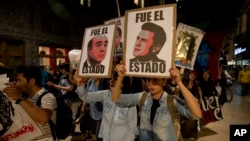The popularity of Mexican President Enrique Pena Nieto has sunk amid concerns about his handling of security problems and corruption, polls showed on Monday, in a sign that his ruling party could lose ground in elections next year.
Polls noted the sharp drop in his approval rating since the apparent massacre of 43 trainee teachers students and a conflict of interest scandal involving a home being purchased by the first lady.
The approval rating of Pena Nieto fell from 50 percent in August to 39 percent in November in a poll by daily Reforma, while paper El Universal showed 41 percent approved of his leadership in November compared to 46 percent in August.
Reforma noted it was the lowest approval rating of a president recorded since 1996 as then President Ernesto Zedillo was struggling to contain a financial and economic crisis.
El Universal's data showed the president was at his most unpopular since assuming office on Dec. 1, 2012 for a six-year term.
The sharp drop in popularity could undermine the hopes of his Institutional Revolutionary Party to gain ground in congressional and local elections next year. The PRI holds a plurality in both houses of Congress, but it lacks a majority.
"This is going to have an impact in the elections," said Javier Oliva, a political analyst at the National Autonomous University.
Pena Nieto is under growing pressure from protesters to end impunity and brutality by security forces since the group of trainee teachers were abducted by corrupt police and handed over to a local drug gang in southwestern Mexico on Sept. 26.
Protest marches were set for the capital on Monday and in many other cities around the country. Some demonstrators demand the president resign.
Last week, Pena Nieto announced reforms to stop collusion between police and criminals in a bid to quell protests.
Feeding unpopularity is a scandal over a $3.75 billion, high-speed train contract. The government abruptly revoked the single-bid deal shortly before disclosures that the first lady was acquiring a luxury home owned by a company in the bidding consortium.
Reforma said it interviewed 1,020 Mexicans from Nov. 20-23, with a margin of error or 3.1 percent, while El Universal polled 1,000 people from Nov. 8-12, with a margin of error of 3.5 percent.






